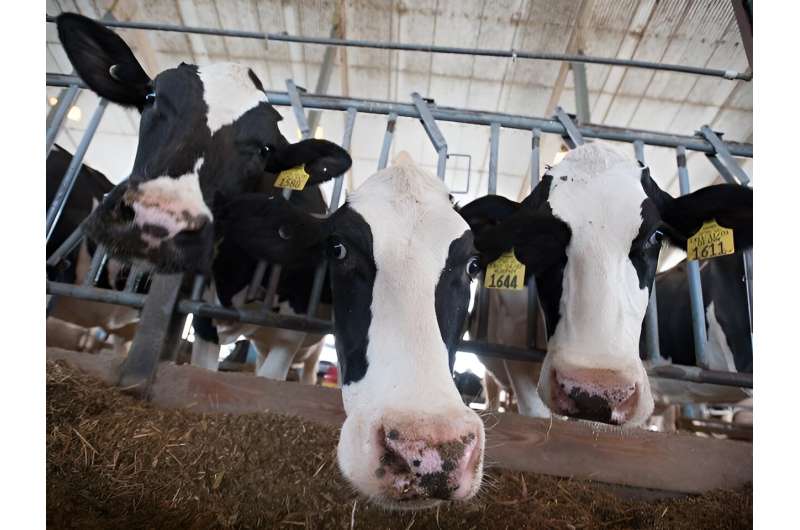This article has been reviewed according to Science X's editorial process and policies. Editors have highlighted the following attributes while ensuring the content's credibility:
fact-checked
peer-reviewed publication
trusted source
proofread
Cattle on low-protein rations may need amino acid supplement to boost milk yield

When dairy cows are fed diets with reduced protein concentrations—aimed at decreased environmental nitrogen pollution from their manure such as nitrate leaching, nutrient-laden run-off and ammonia volatilization—their milk production can suffer. Supplementing the amino acid histidine may help in maintaining, and even increasing, milk and milk-protein yields.
That's the conclusion of a study conducted by an international research team led by Alexander Hristov, Penn State distinguished professor of dairy nutrition and a leading authority on greenhouse gas and other emissions from ruminant animals. The researchers published their findings in the Journal of Dairy Science.
Histidine is an essential amino acid for protein synthesis—the process that creates the molecules that help maintain biological functions and health in humans and animals, including dairy cows, Hristov explained. He added that earlier studies in Europe have shown that low histidine levels can limit milk production in dairy cows fed diets based on grass silage, which is the predominant forage in Northern Europe.
Limited histidine was not considered a challenge for dairy cows fed typical North American diets until research conducted in Hristov's lab in the College of Agricultural Sciences at Penn State a few years ago revealed the problem. In those experiments, blood histidine concentrations dropped significantly when cows were fed reduced-protein diets aimed at curbing nitrogen losses and ammonia emissions from manure.
A series of experiments followed, confirming the importance of histidine to maintain milk production and milk protein content when cows were fed diets with reduced protein concentration. Lactating mammals require large amounts of amino acids to support milk synthesis by mammary glands during lactation, Hristov noted. Amino acid metabolism is a critical process for the lactating mammary gland.
"The culmination of this research was the recently published meta-analysis of 17 studies which concluded that histidine supplementation of dairy cow diets increased feed dry matter intake, milk yield and milk protein concentration," he said.
"Notably, and as Penn State research has shown, the increase in milk protein concentration with histidine supplementation was up to four times greater for cows fed diets that had lowered protein content than diets formulated to provide adequate protein intake, according to diet-formulation models."
Histidine is unique among the essential amino acids because there are body reserves that can serve as sources of histidine and mask short-term deficiencies, Hristov said. For that reason, histidine effects in dairy cows should be studied in long-term, continuous-design experiments.
"Further, microbial protein synthesized in the rumen—which is the main source of amino acids for the cow—is low in histidine, relative to other potentially milk-limiting amino acids," Hristov said.
"That supports our hypothesis that histidine becomes the first limiting amino acid when cows are fed low-protein diets. So, the role of microbial protein as a source of amino acids for milk protein synthesis and body functions becomes even more critical."
More information: S.E. Räisänen et al, Lactational performance effects of supplemental histidine in dairy cows: A meta-analysis, Journal of Dairy Science (2023). DOI: 10.3168/jds.2022-22966
Journal information: Journal of Dairy Science
Provided by Pennsylvania State University



















